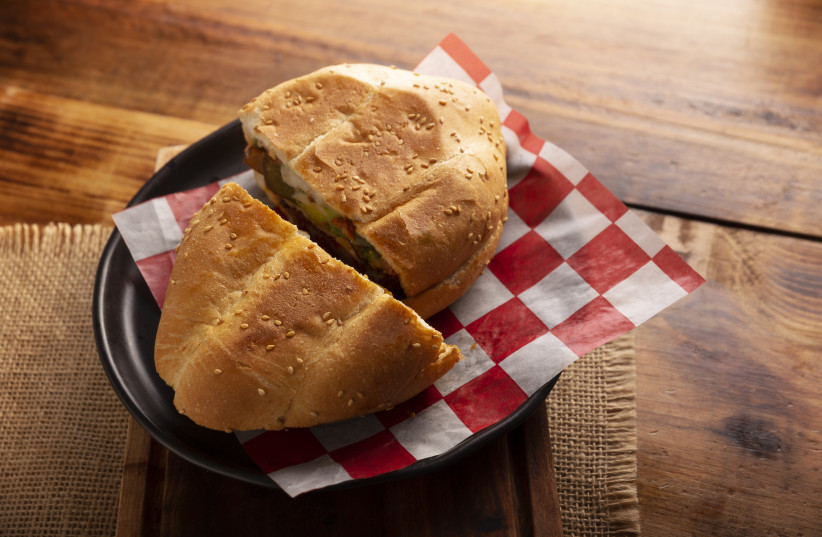Aroma Espresso Bar in Beit Shemesh, like many other restaurants and coffee shops in Israel, has been closed to the public since the Hamas terror attack on October 7. Yet, since the war started, the coffee shop has been buzzing with activity six days a week. Each day, the café fills with close to 150 people from Beit Shemesh and the surrounding areas. What exactly are these people doing there?
Sunday through Friday mornings, the restaurant, where diners used to enjoy leisurely meals of coffee, pastries, sandwiches, and salads, turns into a frenzied, yet well-managed sandwich assembly line, operated by volunteers from Bet Shemesh, local moshavim, and area schools who prepare cheese and omelet sandwiches. Once the sandwiches have been prepared and packed, volunteer drivers transport the food to distribution points throughout the country and Aroma branches, where they are provided free of charge to soldiers.
Making sandwiches for Israel's soldiers
Since the outbreak of the war, Aroma Israel has been supplying 10,000 sandwiches each day to soldiers throughout the country. As the company’s primary factory that bakes the company’s bread and other goods is located in the industrial area of Bet Shemesh, making the local Aroma branch the assembly point was a logical choice.
Ronen Galimidi, who heads the Aroma factory in Bet Shemesh, says that the omelet sandwich is the most popular. The branch remains open for sandwich preparation until the day’s allocation of sandwiches has been reached. Galimidi says that the initiative came from Yariv Shefa, owner of Aroma Israel, which is bearing the considerable cost of preparing 60,000 sandwiches weekly.
I arrive at the Bet Shemesh branch at 7 AM on Wednesday, and the first volunteers begin to trickle in at about 7:45. Aroma employees are busy preparing omelets, boxes of tomatoes are stacked outside, and loaves of bread are everywhere. Volunteers rinse their hands, then don gloves for sandwich preparation. The tables are arranged into two lines with chairs on either side, and volunteers spread cheese, piled on tomatoes and pickles, bag and pack the sandwiches. The omelet sandwich line follows a similar structure, with different ingredients.

To volunteers of a certain age, the assembly line evokes memories of the famous I Love Lucy skit from the 1950s, in which Lucy and her neighbor, working in a chocolate factory, had difficulty keeping up with the conveyor belt. My job is placing the tomatoes and pickles on the bread and putting the slice of bread on top. Finding myself with a few excess pickle slices on the table, I have to control myself and refrain from popping them into my mouth.
Shmuel and Nechama Fuchs, a retired couple living in Bet Shemesh, have been volunteering at Aroma for two weeks. Originally from Far Rockaway, the couple says that coming each day helps them take their mind off of things, and “makes you feel like you are doing something.” Today, most of the early volunteers are English speakers, but the population of volunteers is constantly in flux.
Cries of “We need to speed up here,” “We are about to run out of cheese,” and “More cheese! More tomatoes!” echo throughout the air, and the atmosphere remains upbeat. Arik Einstein singing “Yesh Li Ahava” (I’ve Got Love) wafts through the restaurant’s sound system, and the crinkling of sandwich paper is heard throughout, as sandwiches are constantly being wrapped and packed.
Some volunteers have been attending daily. Another says this is his first sandwich-making experience, as he had been picking cucumbers in Kibbutz Karmia, between Ashkelon and Gaza until now. The repetitive motion of reaching in to select two tomato slices and four pickles evokes memories of carpal tunnel syndrome, and another volunteer chimes in, informing everyone that while most people associate it with excessive typing, it is the disorder most commonly reported in the meat-packing industry.
Outside the restaurant, volunteers inscribe hand-written messages on the sandwich bags that will be distributed to the soldiers. The message on the bag, written in Hebrew, reads appropriately, “Bon Appetit, our hero.”
